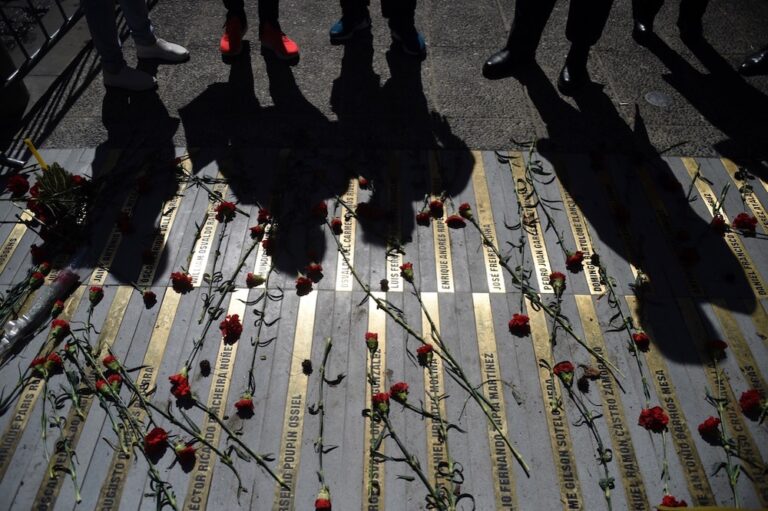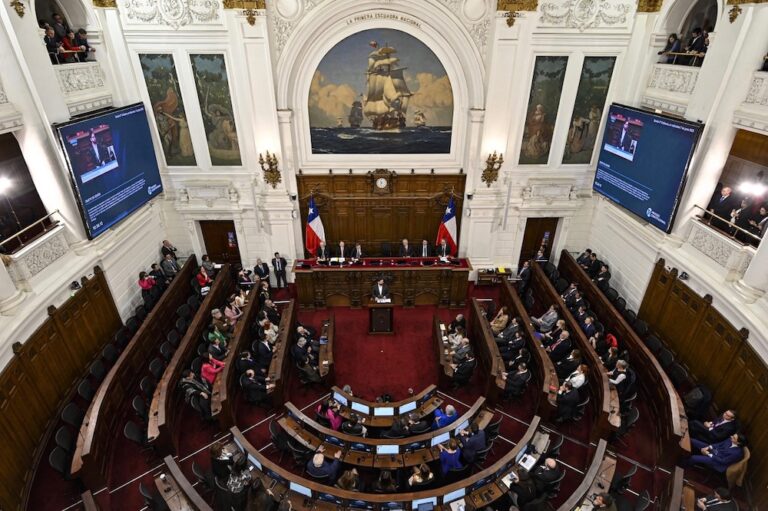(IPYS/IFEX) – On 7 December 2001, moments before she was about to present her documentary “Estadio Nacional” (“National Stadium”) at the recent Cuba Festival, journalist Carmen Luz Parot received some bad news. The government company Metro S.A. refused to place posters promoting the documentary on Santiago’s subway platforms. The documentary tells the story of those […]
(IPYS/IFEX) – On 7 December 2001, moments before she was about to present her documentary “Estadio Nacional” (“National Stadium”) at the recent Cuba Festival, journalist Carmen Luz Parot received some bad news. The government company Metro S.A. refused to place posters promoting the documentary on Santiago’s subway platforms. The documentary tells the story of those who were detained in the stadium, immediately following the coup in 1973.
As documentary producer Soledad Silva told the free daily “La Voz de la Tarde”, on 9 November she approached the Metro marketing office to request that the poster advertising the documentary be included in the “Metro Informa” (“Metro Informs”) displays. This space is used by the subway transit company to inform the public about different artistic, cultural and academic events.
The documentary’s production team followed the procedure required in order to have one’s information posted in this space – that is, they brought the promotional material to Metro at least one month before it was to be posted.
Silva stated that “I personally brought the letter of request to Adriana Celis Olate, of the Metro marketing office. Upon reading the letter, she asked me for a copy of the poster and agreed to display our information in December.”
According to the information the producer provided to “La Voz de la Tarde”, a few days later thirty-five posters, to be placed in the displays at the various subway train stations, were brought to Metro . Nevertheless, on Thursday 6 December Celis informed the producer of “Estadio Nacional” that Metro would not install the posters in its displays “because of their political content.” Celis added that the posters “could prove counterproductive for the Metro’s clients.” According to Silva, Metro’s head of marketing stated that “it is as if you had given me a UDI [Chile’s main right-wing party] poster.”
Silva noted that she tried to explain the documentary’s aim to the Metro marketing department. “It was not a political piece but an investigation into the incidents which occurred in our stadium in 1973.”
Metro S.A.’s refusal to distribute the “Estadio Nacional” poster seems contradictory, considering that the documentary was financed by two government entities, the National Arts Fund (Fondo Nacional para las Artes, Fondart) and the Public Works Corporation (Corporacion de Fomento, Corfo), as well as by the Ford Foundation.
When Silva tried to defend the documentary she was told that “these are the statutes and that is that.”
The journalist who reported on the incident for “La Voz de la Tarde” confirmed this, saying that Metro provided him with the same response when he contacted them to confirm the story.
The documentary “Estadio Nacional” contains uncut testimonies and images from the days following the coup d’état in September 1973, when the stadium was used as a detention and torture centre. It was awarded the Grand Prize at the Santiago Documentary Festival, held in the capital at the beginning of November.
Speaking from Havana, Carmen Luz Parot, the documentary’s director, described as “very grave” Metro’s refusal to display the promotional posters. “The government transit company Metro has censored the distribution of thirty-five posters of the documentary “Estadio Nacional”, simply stating that this is an institutional policy,” she told “La Voz de la Tarde”. “No one has asked us for a copy [of the documentary],” Parot added. “As a journalist and audiovisual artist, I have never followed the mandate of a political organisation, and neither I nor any of the individuals who participated in putting together the documentary belong to a political party. Even if this were the case, it is not acceptable for a public transport company to censor a poster advertising a documentary. This work forms part of Chile’s cultural heritage and was produced with the financial support of some state institutions, the same ones that finance the transport company,” Parot told “La Voz de la Tarde”.
“It is unacceptable that after so many years the work of defending human rights is still as difficult and arduous as ever,” Parot remarked.
Parot is a journalist and a former producer for the now defunct Canal 2 television station. She is also the director of “El derecho a vivir en paz” (“The right to live in peace”), a documentary on Víctor Jara.
Recommended Action
Send appeals to authorities:
– condemning Metro S.A.’s refusal
– asking for measures to rectify this incident and prevent any more such occurrences
Appeals To
Fernando Bustamante
President of the Board of Directors, Metro S.A.
Fax: +56 2 671 1373
Jimena Vera
Head of Marketing, Metro S.A
Fax: +56 2 698 5186
Please copy appeals to the source if possible.


